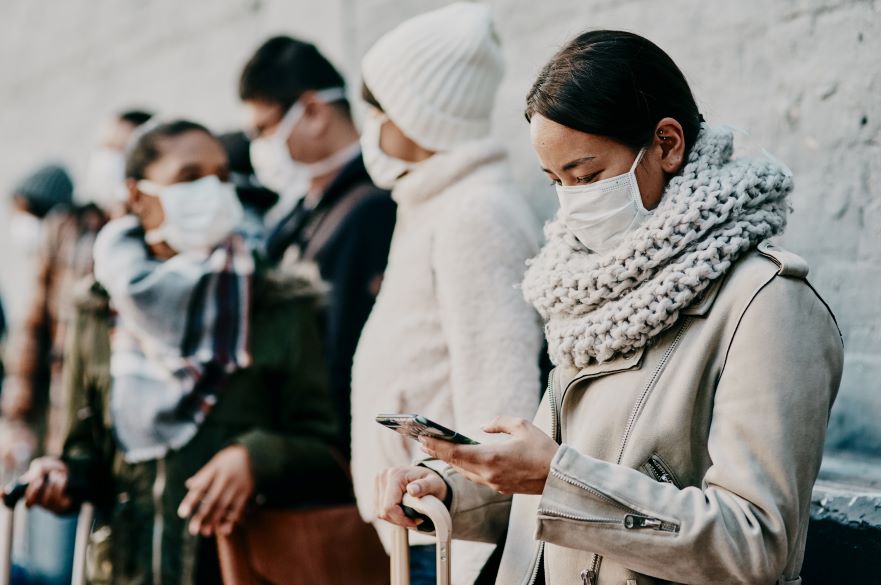Expert Blog: How the role of social science and knowledge exchange systems have helped to tackle Covid-19
As the Covid-19 National Foresight Group publishes its reports and products online, the researchers reflect on the important role of the group
By Becky Timmins | Published on 6 October 2020
Categories: Nottingham Civic Exchange; Research; School of Social Sciences;

Whilst much has been said of the great work of researchers to model, treat and develop vaccines for Covid-19, there has been less light shone on the work of many social scientists who have worked tirelessly to understand and share learning on how it impacts on people, communities and organisations. This is a story about a small group doing important work in this space.
At NTU a group of colleagues have been working to provide academic insights into a wide range of topics and challenges that the pandemic has created. In March we were approached to support a new cross-government and multi-agency group called the C19 National Foresight Group. During the height of the local lockdown the group met every day to explore and share insights from across their respective areas of expertise. Within that group NTU sat (virtually) to offer support and ideas from academic research. Initially this was done verbally by sharing rapid scoping reviews of the literature on a specific topic, but soon moved to more formal written intelligence briefings that could be shared across government, local authorities and strategic first responders like the Local Resilience Forums - a partnership of stakeholder organisations who work behind the scenes in every local authority area to deal with any emergency that occurs across the UK.
The NTU team made up formally of Dr Rowena Hill, Rich Pickford and Kelly Smith, and ably supported by a growing cast of hard working and skilled colleagues, have lived a multi-disciplinary model bridging the gap between academia and practice, working to support and challenge within rapidly evolving and shifting timelines. Our work had to balance the need for academic rigour whilst also ensuring that 80% of the answer now was better than 100% of it next week.
These briefings were informed by the group’s collective knowledge of the wider academic understanding of topics and soon highlighted a need to delve deeper. We subsequently hosted a series of more in-depth strategic roundtables to better understand these issues, alongside a truly innovative product developed with the Hydra Foundation. This product allowed us to collect the views of emergency managers across the country and what they felt was going well, what they are proud of and what they feel could be changed in the future, in real-time as opposed to some months or years down the line; this enabled shared learning, promoted collegiality and prompted changes where possible.
These outputs focus on foresight in relation to the themes of:
- Education
- Lockdown behaviour
- Local Health Protection Areas
- Communication
- At Risk Populations
- Young people and families
- Communities
- Psychological Impacts
- Sharing of Lessons about Covid-19
- Health and Wellbeing
- Economics
- Inequalities
- Work
- Crime and Judicial Systems
- Emergency Management Structures
The last theme covers aspects such as how the pre-Covid structures, including the Local strategic decision-making structures, and the new Covid-19 health structures, including he Joint Biosecurity Centre, are managing the pandemic across the UK. It covers how they are working together and how they are likely to manage over the next few months under a range of demands, including: EU Transition, winter weather, seasonal flu and winter pressures within the NHS. The second wave is likely to impact in broadly similar ways to the first, and so we need to use the evidence and experience of the first wave to help us better prepare for the second.
It is hoped that the release of these documents will enable local communities and those preparing for the second wave to do so with as much support as possible. It has been a pleasure to see the hard work and commitment of colleagues adapting, developing and setting up new systems to help make a difference as we learn to live with Covid-19 in our world.
Dr Rowena Hill, Associate Professor, School of Social Sciences
Rich Pickford, Knowledge Exchange and Impact Officer, Nottingham Civic Exchange
Find out more about the reports published by the Covid-19 National Foresight Group
Check here for the latest coronavirus advice and updates from NTU
Nottingham Civic Exchange
Nottingham Civic Exchange has been established by Nottingham Trent University to maximise research, policy and practical impact by bringing together university expertise with partners seeking to address the needs of communities. Nottingham Civic Exchange acts as a resource to look at social and economic issues in new ways. This means facilitating debate, acting as a bridge between research and policy debates, and developing practical projects at a local, city and regional level.
Visit our website - www.ntu.ac.uk/nce Contact us - notts.civicex@ntu.ac.uk Follow us - @NottsCivicEx